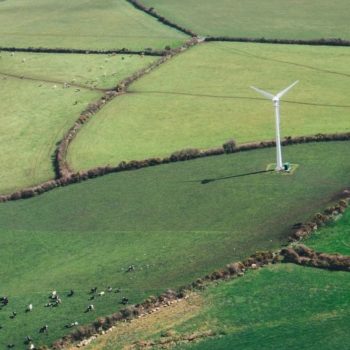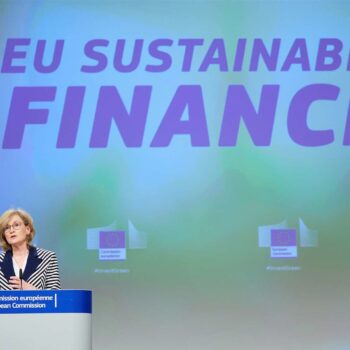Imagine you are planning to invest in the stock market for your children. When asked by the customer advisor, you choose to invest in a sustainable investment fund. It is even labelled green under the EU taxonomy, the EU-wide classification for sustainable economic activities. At home, you go through the investment prospectus and discover that the fund holds shares in a well-known French nuclear power corporation, as well as a German gas production company.
If some EU Member States have it their way, this could soon become a reality. This would seriously damage the credibility of the taxonomy as a transparency tool against “greenwashing” (declaring non-sustainable assets as such). Germany’s position as an influential voice in the EU could be crucial here.
Science-based criteria perish in political tug-of-war
The EU Commission’s current proposal clearly excludes gas power and nuclear power from classification as sustainable investments. However, earlier this year, there was fierce opposition from some pro-gas and pro-nuclear EU Member States, including a majority of Eastern European countries, threatening to veto the legislation. Germany’s failure to clearly commit to a science-based taxonomy did not help. In the course of the dispute, the EU Commission decided to clarify the issue of fossil gas and nuclear energy in a separate legal act. This was in response to pressure from France, which had organised a pro-nuclear coalition of Member States.
Since then, the Commission has delayed publishing a decision on the legal act, partly to have clarity on the course of a new German government. However, this has led to a situation where the incumbent caretaker government lacks control of the taxonomy process. Publicly, the German government has so far expressed its opposition to classifying nuclear power as a sustainable source of energy, while the Social Democrats (SPD) have in many cases been open to fossil gas in the taxonomy.
A decision is now imminent and could come as early as the end of November, meaning the taxonomy, as of now, will likely classify nuclear power and fossil gas as sustainable under certain conditions. A so-called “non-paper” that circulated in Brussels last week further fueled the debate. The paper allows for an extremely generous sustainability definition of gas power and nuclear power.
Three common misconceptions about the EU taxonomy
- Misconception 1: The taxonomy restricts private investment.
In fact, the taxonomy is just a labelling tool, a definition to distinguish sustainable from non-sustainable economic activities. The taxonomy only guarantees that, for example, a pension fund that claims to invest sustainably actually does so. But it does not prohibit certain investments, nor does it make them less attractive in a cost-of-capital comparison. One possible effect of the taxonomy could be that the financing of sustainable investments on capital markets becomes more favourable due to mere investor demand, or that the capital costs of non-sustainable economic activities become more expensive. Whether this will happen, however, is up to market forces alone.
- Misconception 2: EU states must adapt their investment policies.
Just as private investors do not have to align their investments with the taxonomy, states can continue to finance their national energy priorities. There are no plans to introduce the taxonomy as a mandatory tracking tool for government investment. Even at the EU level, the taxonomy has so far played a marginal role, such as in the European Recovery and Resilience Fund. Investments that are neither financially nor environmentally sustainable (think nuclear energy) are thus not curtailed by the taxonomy.
However, the taxonomy can be an important tool to communicate transparently to citizens about where public investments flow. However, this requires a taxonomy that corresponds to a science-based definition of sustainability. Environmentally harmful investments would still be possible, but they should not be sold to taxpayers as “green”.
- Misconception 3: The size of the European capital market assures the taxonomy a “gold standard”
The EU has presented the taxonomy as its flagship initiative to position the European capital market as a frontrunner in the sustainable finance race. It is also the cornerstone for the financing of the EU Green Deal and forms the core of the EU Sustainable Finance Strategy. But it will not automatically be the guiding star for sustainable investment. Voluntary initiatives, such as the EU’s own Green Bonds issued under the Next Generation EU Framework and the Climate Bonds Initiative Standard, are already guiding sustainable investments. To date, these are stricter in their specifications (excluding gas and nuclear energy) than the “non-paper” circulated in Brussels.
Therefore, there is a risk that the taxonomy will not be applied at all in financial markets, or at least only to a limited extent. If the proposed rules were to be taken up by the Commission’s legislative act, the EU would deprive itself of its pioneering role and blatantly weaken its position in the international competition to build a sustainable financial system.
Litmus test for Germany
While a watered-down taxonomy would create marginal additional investment scope for gas or nuclear energy projects, the EU would face significant reputational and acceptance risks in the market. The UN Net-Zero Asset Owner Alliance, which comprises $10 trillion in capital investments, has already signalled that fossil gas and nuclear power cannot be considered sustainable. It is difficult to imagine that a taxonomy, once damaged, would easily regain credibility.
All eyes are now on Germany. Only recently, Frankfurt Main Finance was awarded the contract for the location of the International Sustainability Standard Board. At the COP26 climate conference in Glasgow, the German government committed to phasing out public financing of fossil fuels abroad. Next year the German G7 presidency will have to push the issue of sustainable finance further. The taxonomy will be a litmus test of whether the new coalition will deliver on its promise to be a climate government. Any claims of striving for a more sustainable economic system would be meaningless if they cannot even agree on a science-based definition of sustainability.
By manoeuvring and advocating the inclusion of fossil gas in the taxonomy, the federal government has opened the door to horse-trading with France on the taxonomy issue, including both nuclear power and fossil gas. If the future self-proclaimed climate chancellor (and current finance minister) Olaf Scholz does not want to burden the new government with an untrustworthy taxonomy, he must make it clear as soon as possible: A taxonomy that favours gas and nuclear power does no justice to Germany’s ambition for sustainable finance leadership, nor to the EU’s.
This op-ed was originally published in Tagesspiegel Background Klima & Energie on November 15th 2021.
A decision on the Taxonomy is still imminent and the new German government is now in a key position to make clear to the Commission that the Taxonomy must not be compromised by lowering the ambition. E3G has outlined how a weak Taxonomy could impact the international dimension of the EU’s Climate- and Sustainable Finance diplomacy. A Taxonomy including nuclear energy and fossil gas as sustainable would put the EU’s leadership position at risk. The briefing can be found here.


